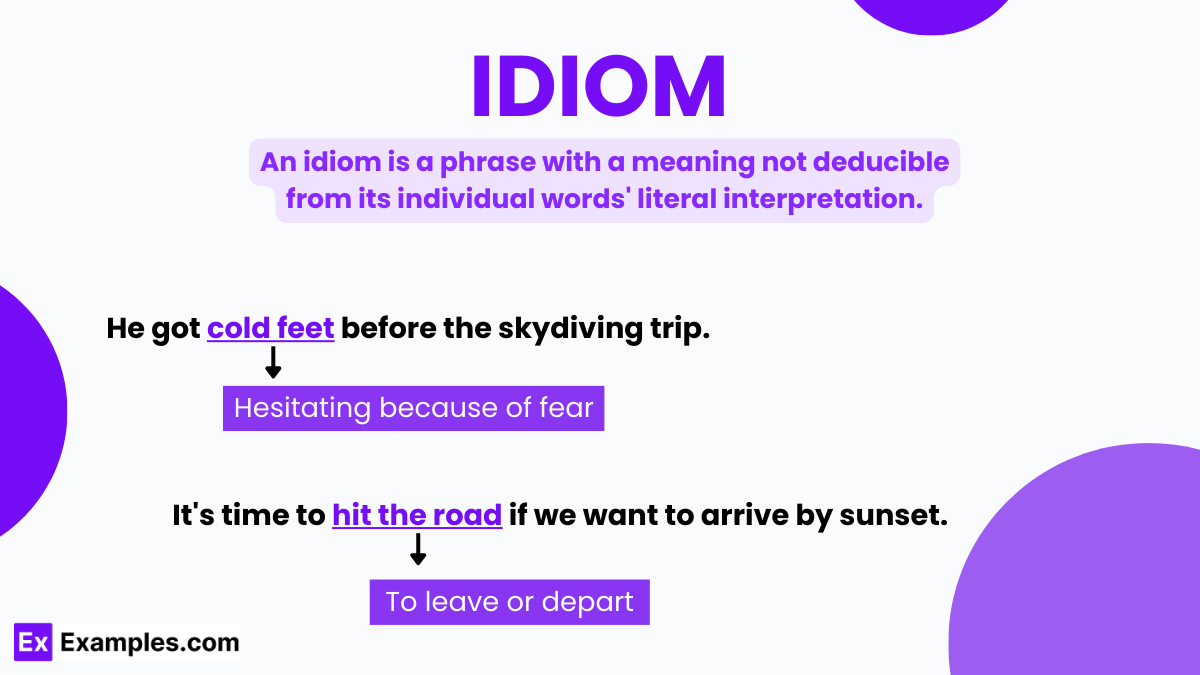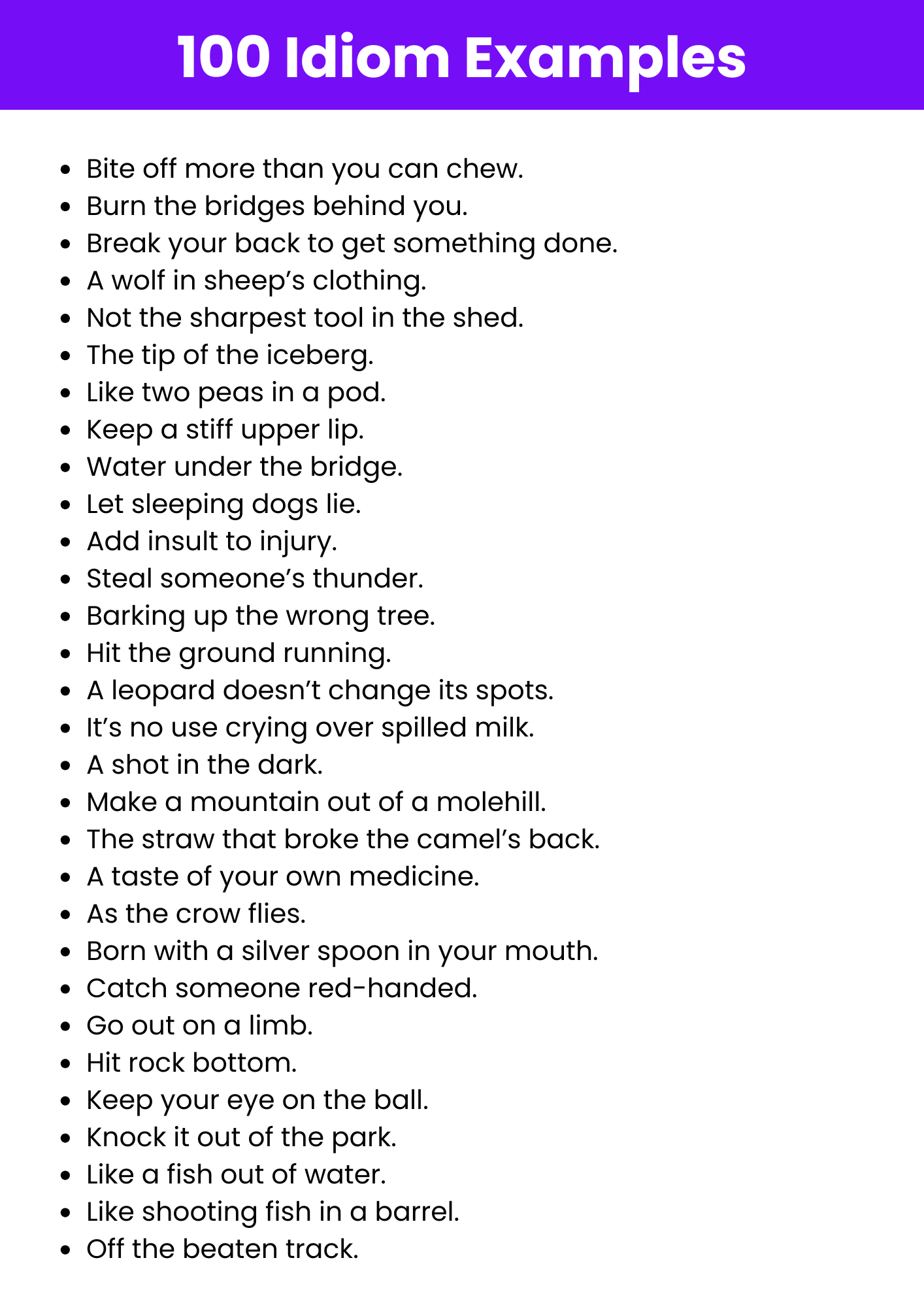Idiom
What is an Idiom? – Definition
An idiom is a phrase or expression that has a figurative meaning different from its literal meaning. Idioms are commonly used in everyday language to convey ideas more vividly and succinctly.

Generated Idiom Examples

Examples of Idioms
- Break the ice.
- Spill the beans.
- Kick the bucket.
- Let the cat out of the bag.
- Piece of cake.
- Hit the nail on the head.
- Bite the bullet.
- Once in a blue moon.
- Under the weather.
- The ball is in your court.
- Back to the drawing board.
- Burn the midnight oil.
- Break a leg.
- Cost an arm and a leg.
- Let sleeping dogs lie.
- Hit the sack.
- Kick the habit.
- Once bitten, twice shy.
- Bite off more than you can chew.
- Burn the candle at both ends.
- A blessing in disguise.
- Under the weather.
- Once in a blue moon.
- A dime a dozen.
- Hit the books.
- Break a leg.
- Let the cat out of the bag.
- Spill the beans.
- Kick the bucket.
- Bite the bullet.
Types of Idiom
Pure Idioms
Pure idioms are expressions whose meanings are entirely figurative and cannot be deduced from the individual words.
- Keep your chin up.
- The ballpark figure is way off.
- Throw in the towel.
- Blow your own trumpet.
- Draw the line.
Binomial Idioms
Binomial idioms use pairs of words (joined by conjunctions or prepositions) that create a specific figurative meaning.
- Wear and tear.
- Step by step.
- Odds and ends.
- Through thick and thin.
- Neck and neck.
Partial Idioms
Partial idioms combine an idiomatic part with a literal meaning, creating a phrase that partially relies on context.
- Hold your horses.
- Get your feet wet.
- Cry over spilled milk.
- Let the dust settle.
- Beat around the bush.
Prepositional Idioms
Prepositional idioms involve prepositions that add a unique figurative meaning to the phrase.
- In hot water.
- Over the moon.
- Behind the times.
- Under one’s nose.
- Out of sight, out of mind.
Proverbs
Proverbs are short sayings that convey traditional wisdom or advice.
- A stitch in time saves nine.
- Rome wasn’t built in a day.
- Don’t bite the hand that feeds you.
- You can’t have your cake and eat it too.
- Too many cooks spoil the broth.
Euphemisms
Euphemisms soften harsh or direct statements, especially on sensitive topics.
- She’s in a better place now.
- We need to let you go (instead of fire).
- He’s between the lines (instead of in trouble).
- Passed on to glory (instead of died).
- A little thin on top (instead of bald).
Clichés
Clichés are overused phrases that have lost their originality but are still widely recognized.
- Love conquers all.
- It’s a small world.
- Time heals all wounds.
- Better safe than sorry.
- Every dog has its day.
How to Identify/Find Idiom?
To identify idioms, look for phrases that have meanings not deducible from the individual words. Idioms often convey a figurative meaning that is understood through common use rather than literal interpretation.
- Look for phrases that don’t make literal sense when taken word for word.
- Identify expressions that convey a meaning different from their literal definitions.
- Check if the phrase is commonly used to express a particular idea or sentiment.
- Notice if the phrase adds cultural or contextual significance.
- Look for idioms that enhance the narrative or conversational flow.
How to Use Idiom?
Use idioms to enrich your language by incorporating culturally recognized expressions that convey complex ideas succinctly. Ensure your idioms are appropriate for the context and audience to enhance communication effectively.
- Choose idioms that fit naturally within your conversation or writing.
- Use vivid and familiar idioms to make your expressions more relatable.
- Integrate idioms seamlessly to maintain the flow of your narrative.
- Ensure the idiom enhances the clarity or emotional impact of your message.
- Avoid overusing idioms to prevent your language from becoming cliché.
Other Idiom Examples
Idioms in Daily Life
Daily life is filled with idioms that help us convey our thoughts, feelings, and experiences more vividly.
- Call it a day.
- Cut to the chase.
- It’s raining cats and dogs.
- Hold your tongue.
- Keep an eye on it.
Idiom Examples for Kids
Introduce children to the enchanting world of kid-friendly idioms with relatable expressions like “spill the beans” or “piece of cake.”
- The cat’s out of the bag.
- As cool as a cucumber.
- You’re a fish out of water.
- The apple doesn’t fall far from the tree.
- Don’t cry wolf.
Idiom Examples for Students
Empower students with idioms that make learning engaging. Discover how “break the ice” or “spill the beans” can enhance communication and understanding.
- Hit the books.
- Pull an all-nighter.
- Learn the ropes.
- Put your thinking cap on.
- The sky’s the limit.
Idiom Examples for Poems
Rich and evocative idioms that enhance the beauty and imagery in poetic language.
- A heart of gold.
- Time flies on silver wings.
- A storm in a teacup.
- Stars in your eyes.
- A heavy heart.
Idiom Examples for Halloween
Descriptive idioms that depict trees as more than just plants, highlighting their strength, beauty, and presence.
- Skeletons in the closet.
- Scared out of your wits.
- A ghost of a chance.
- It’s a haunting melody.
- Devil’s advocate.
Idiom Examples for High School
Descriptive idioms that depict trees as more than just plants, highlighting their strength, beauty, and presence.
- Make the grade.
- Walk a mile in someone’s shoes.
- Pass with flying colors.
- Out of your league.
- Burn the midnight oil.
Explore Other Literary Devices
Elevate Your AP English Preparation
Unlock your potential with our comprehensive AP English exam preparation tools designed to help you excel.
- Extensive Question Bank: Access 900+ exam-like questions for both AP English Language and Literature.
- Expertly Crafted: Questions mirror the structure and difficulty of actual AP exams, ensuring relevant practice.
- Detailed Explanations: Understand your mistakes with clear, concise breakdowns of correct and incorrect answers.
- Personalized Learning: Tailor your study sessions with topic-specific tests and adaptive learning tools.
- Comprehensive Coverage: Master all aspects of the AP English curriculum with extensive guides and resources.
Frequently Asked Questions
-
What is an idiom?
An idiom is a phrase or expression that has a figurative meaning different from its literal meaning. Idioms are commonly used in everyday language to convey ideas more vividly and succinctly. -
How does an idiom differ from a metaphor?
Unlike metaphors, which make direct comparisons between two unrelated things, idioms are fixed expressions with meanings that are not deducible from the individual words. Idioms add color and expressiveness to language without relying on direct comparison. -
Why are idioms important in writing?
Idioms enrich writing by adding cultural context and expressiveness. They make language more engaging and relatable, helping to convey complex ideas in a concise and memorable way. -
Can idioms be used in formal writing?
While idioms can add flair to writing, they should be used judiciously in formal contexts. Overuse or inappropriate use of idioms can make writing seem informal or unclear. It’s important to ensure that idioms enhance rather than detract from the clarity and professionalism of the text. -
How can I effectively create my own idioms?
Creating effective idioms involves crafting unique expressions that convey specific meanings or sentiments. Focus on using vivid imagery and culturally relevant references to make your idioms memorable and impactful. Ensure that the meaning is clear within the context of use.

